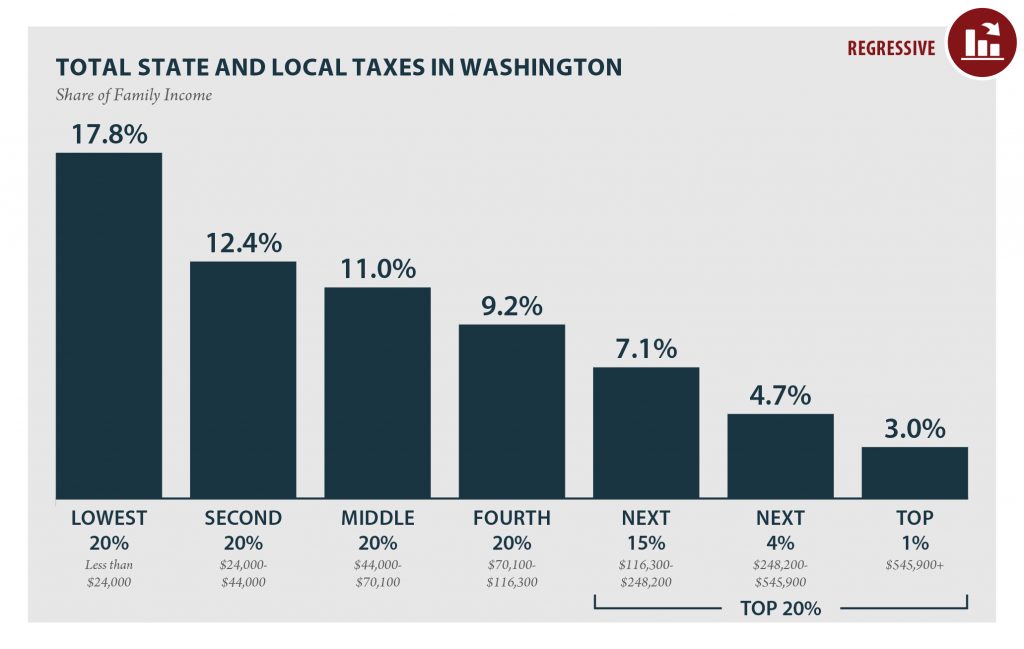North Carolina lawmakers may have approved a massive tax subsidy giveaway to Apple, but we won’t let that news spoil our barrel this week. Nor will we be discouraged by Connecticut Gov. Ned Lamont’s threats to upset the apple cart full of positive progressive tax reforms state lawmakers recently came together to approve. And we’ll maintain hope that leaders attempting to stop regressive tax cuts in Nebraska are successful with their second bite at the apple in coming weeks. Why all the optimism? Because the apple of our eye this week is Washington State, where advocates and lawmakers succeeded in a decade-long fight to bring a bit of balance to the most upside-down tax code in the nation through both a tax increase on rich households and a helpful credit to reduce taxes for middle- and low-income families.
Major State Tax Proposals and Developments
- WASHINGTON leaders achieved two tremendous progressive tax victories this year, each of which was over a decade in the making. First, they approved and funded a Working Families Tax Credit that is modeled after the federal Earned Income Tax Credit (EITC) and improves on it by including immigrant families who work and pay taxes but are excluded from the federal credit. Then over this past weekend, they approved a first-of-its-kind excise tax on extraordinary profits from capital gains exceeding $250,000. These developments headline an underappreciated string of progressive wins throughout the states this year, and are truly monumental considering the state currently has the most upside-down tax code in the nation and a prohibition on the personal income tax, the main tool that other states use to advance tax justice. – DYLAN GRUNDMAN O’NEILL
State Roundup
- ARKANSAS finalized several tax cuts including expanding the sales tax exemption for used vehicles, expanding the numbers of items exempted from the ‘Back to School’ sales tax holiday, and enacting tax reductions for timber companies and steel mills.
- CONNECTICUT’S joint House-Senate Finance Committee advanced a tax package to the full legislature last week that includes multiple progressive tax improvements. Most notable among these are a new Child Tax Credit, an increased EITC (from 23 percent of federal to 40 percent), a 2 percent surcharge on unearned income from capital gains, a small 0.7 percent surcharge on incomes exceeding $500,000, and a 1.5 percent surcharge on incomes exceeding $13 million. Gov. Ned Lamont, however, is opposed to several aspects of the package, so negotiations are ongoing.
- GEORGIA Gov. Brian Kemp signed a new $5-a-night excise tax for short-term home rental companies into law. State fiscal analysts estimate that the measure could increase tax revenue by over $17 million in FY 2022. The Governor also signed an income tax credit into law for recruiting and retaining teachers at underserved public schools.
- HAWAII legislation that would grant counties the ability to impose their own additional hotel rooms tax of up to 3 percent moves Gov. David Ige. Meanwhile, lawmakers and advocates continue to make the case for tax legislation that will make strides in righting the state’s upside-down tax system.
- Experts and advocates in IOWA are questioning “what is the rush?” regarding an effort to accelerate income tax cuts that passed in 2018 but weren’t meant to take effect until the state hits a specified revenue trigger. Expediting the cuts is all the more questionable considering it could cost the state $350 million in federal aid on top of the direct hit to the state budget.
- KANSAS Gov. Laura Kelly recently vetoed a tax cut bill that would cost the state $130 million annually; the bill would primarily benefit multinational corporations but also includes a modest increase to the standard deduction. As of now, it’s unclear whether the legislature has enough votes to override the Governor’s veto.
- The LOUISIANA House advanced a bill that would dedicate vehicles sales tax revenue to transportation construction. The larger debate over a revenue-neutral tax swap proposal is ongoing; the tax swap bills passed the House and will now advance to a Senate committee.
- The MINNESOTA House recently passed a tax bill that would, among other things, establish a new 11.15 percent marginal tax rate for single filers earning over $500,000 and joint filers earning more than $1,000,000 and allow ITIN filers to claim the Working Family Credit. The bill is not expected to pass through the Republican-controlled Senate.
- MISSOURI House lawmakers unanimously approved the Senate’s proposed gas tax “increase,” though it’s unclear whether the measure will actually raise badly needed revenue for roads and other infrastructure because it also includes an annual refund of the increase for those who apply. The refund also means higher-income households with accountants are more likely to be able to avoid the tax increase.
- In better MISSOURI news, the House also passed the Senate’s bill to finally become the last state to enforce its sales tax on out-of-state and online retailers like Amazon.
- A MONTANA bill that increases the credit for scholarship programs for private or public schools from $150,000 to $200,000, has passed the Legislature.
- NEBRASKA lawmakers fell two votes short of removing a corporate income tax cut from a larger tax package making its way through the legislature, but there is still time during the two rounds of debate remaining on the bill to remove this regressive tax cut, 83 percent of which would flow to people living in other states. The package still currently also includes fully exempting Social Security benefits from income tax even though the state already exempts most such benefits for all households and all such benefits for low-income households.
- The NEVADA Commission on School Funding has determined that just getting per-pupil spending up to the national average would cost $2 billion over ten years.
- NORTH CAROLINA recently confirmed that Apple will be building a campus in the state’s Research Triangle. This deal came about in exchange for nearly $850 million in state taxpayer funds, along with a sizable local property tax giveaway.
- The OHIO House approved their version of the state budget which includes a 2 percent personal income tax cut and an overhaul of the state’s system for school funding. The bill now moves to the Senate.
- TENNESSEE passed a new law that establishes a six-year statute of limitations for tax collection for individual income, corporate income, trust income, property, sales and use, and excise taxes.
What We’re Reading
- The Center on Budget and Policy Priorities updated its advice on ensuring state responses to Covid-19 produce a robust recovery and build toward an anti-racist and more equitable future.
- Stateline weighs in on attempts in several states to negate the will of voters on measures including a tax increase on the rich in Arizona, a minimum wage increase in Florida, Medicaid expansion in Missouri, cannabis legalization in South Dakota, and many more.
- Governing describes OREGON lawmakers’ ongoing discussions about replacing the state’s gas tax with a miles traveled tax that would share the cost of infrastructure more broadly among drivers of gas, electric, and hybrid vehicles.
- The ARIZONA Center for Economic Progress put out a fact sheet outlining why a flat tax is wrong for the state and would benefit primarily wealthy residents.
If you like what you are seeing in the Rundown (or even if you don’t) please send any feedback or tips for future posts to Meg Wiehe at [email protected]. Click here to sign up to receive the Rundown via email.





